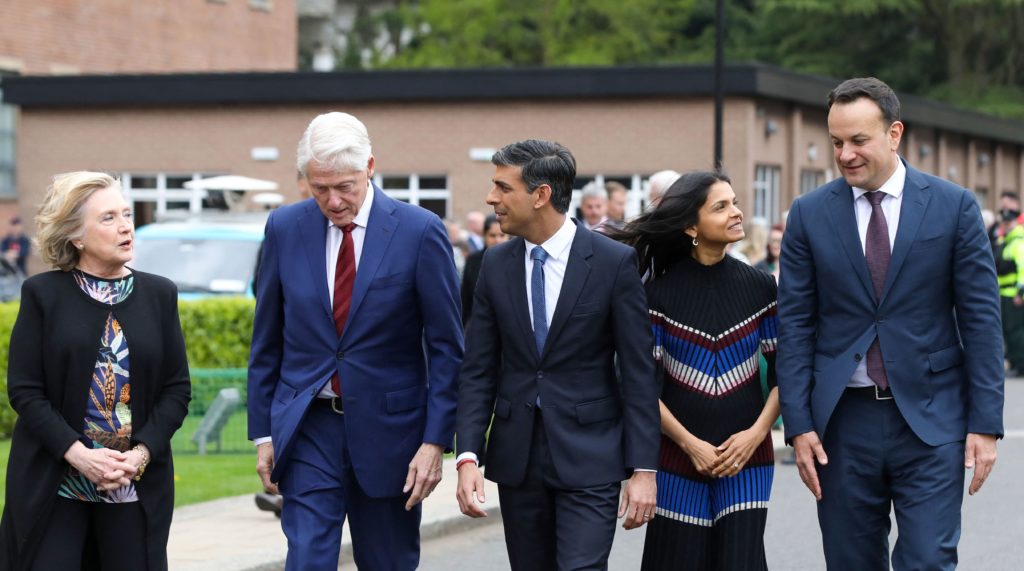TAOSIEACH Leo Varadkar has reaffirmed the Irish nation’s commitment to working towards whatever future the people of Northern Ireland choose for themselves.
Speaking at this week’s Queen’s University conference marking the 25th anniversary of the signing of the Good Friday Agreement, the Irish leader highlighted the importance of “consent” across the people of Northern Ireland when it comes to the future path for the nation.
“The Agreement created a space in which people could articulate and work for the future that they wish to see,” he said.
“And it recognises that we do not need to have the same aspirations in order to cooperate with one another.”
He explained: “The Agreement achieved a delicate but vitally important balance on totemic issues, strengthened by core principles including that of consent and of parity of esteem.
“It recognised the need to encompass the totality of relationships - those within Northern Ireland, North South and between Britain and Ireland.”
He added: “I don’t think this will change. It recognised that people could be British or Irish or both and there is a growing middle ground increasingly willing to do so. That’s significant, I believe.”
 L-r Former US Secretary of State Hillary Clinton, former US President Bill Clinton, Prime Minister Rishi Sunak, his wife Akshata Murty and Taoiseach Leo Varadkar walk together as they leave on the final day of a conference to mark the 25th anniversary of the Good Friday Agreement, at Queen's University in Belfast
L-r Former US Secretary of State Hillary Clinton, former US President Bill Clinton, Prime Minister Rishi Sunak, his wife Akshata Murty and Taoiseach Leo Varadkar walk together as they leave on the final day of a conference to mark the 25th anniversary of the Good Friday Agreement, at Queen's University in BelfastOver three days this week, political leaders from across the world, many who are deemed architects of the Good Friday Agreement, came together in Belfast to discuss the impact of the accord which brought peace to Northern Ireland after many years blighted by the violence of the Troubles.
The Agreement brought power-sharing to the opposing parties, although currently the government institutions it created - the Northern Ireland Executive and Assembly - are out of action due to an ongoing political deadlock over Brexit-related issues.
During his speech in Belfast, in which he applauded those who 25 years ago “challenged our assumptions of what we once thought possible” to create the historic peace agreement, Mr Varadkar claimed “the principle of consent” remains “vital to the Agreement’s success”.
“For nationalists it lays out a democratic path to a United Ireland,:” he explained.
“For unionists, it recognises Northern Ireland’s status as part of the UK and that this will remain the case unless and until a majority of the people of Northern Ireland wish this to change. And indeed, a majority in the South too.”
He went on to commit the support of the Irish nation to bringing power sharing back to Northern Ireland.
“Here in Belfast today I rededicate the Irish Government to continue to work with all the parties in Northern Ireland and with our partners in London to drive the process forward to the benefit of all the people of these islands,” he said.
“Both Governments have an ongoing obligation to honour and implement the Agreement,” he added.
The Taoiseach also took the opportunity to urge the political parties of the North to take action themselves, to get the devolved government moving again.
“The challenges of today require Northern Ireland’s leaders to make the decisions that affect their constituents on the ground,” he said.
“The Good Friday Agreement was about defying historical expectations - we need that kind of leadership still.
“It is incumbent on Northern Ireland’s political leaders today to take the initiative, to see past ‘the shadow of the mountain behind’, to seize control of their history, and to lead their people into the future.
“We as co-guarantors of the Agreement will be here, every step of the way.”

